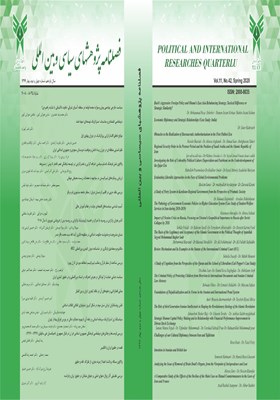ارزیابی رویکردهای لیبرالیستی در مواجهه با معضلات زیست محیطی جهانی
محورهای موضوعی : مجله پژوهش های سیاسی و بین المللی
مسلم صانعی
1
,
ماشاءالله حیدرپور
2
*
![]() ,
داود کیانی
3
,
داود کیانی
3
1 -
2 -
3 -
کلید واژه: لیبرالیسم, محیطزیست, معضلات زیستمحیطی جهانی, همکاری بینالمللی زیستمحیطی,
چکیده مقاله :
مسلم صانعی[1]- ماشاءالله حیدرپور[2]- داود کیانی[3] تاریخ دریافت: 1/10/1397- تاریخ پذیرش: 29/10/1398 چکیده: توسعه و گسترش تمدن صنعتی، علم گرایی و اصالت فرد اگرچه موجب توانمندی انسان در تسلط بر طبیعت گردید لیکن نتوانست جهان زیست آرمانی را فراهم آورد. چالشهای برآمده از دل این روش شناسی معرفتی و معضلات زیستمحیطی جهانی ناشی از آن، پرسشهای اساسی را در برابر اینگونه رفتار خودخواهانه تمدنی و رشد صنعتی افسار گسیخته، در اذهان ایجاد نمود. نظریات مختلف روابط بینالملل نیز در برابر این پرسشگریها راهکارهای مختلفی را ارائه نمودهاند. رویکردهای لیبرالیستی نیز با توجه به مبانی هستی شناختی و معرفتی خود، داعیهدار حل معضلات زیست محیطی جهانی هستند. توجه و تأکید به همکاریهای جهانی، صلح، نقش بازیگران غیردولتی، حقوق بینالملل، نهاد گرایی و رژیمهای بینالمللی از جمله نقاط مثبت نظریات لیبرالیستی در مواجه با معضلات زیستمحیطی جهانی میباشد. از سوی دیگر تأکید بر اصالت فرد و آزادیهای فردی، اولویت مسائل اقتصادی، کم توجهی به سایر عوامل محدود کننده همکاری و منافع ملی قدرتهای بزرگ، عدم توجه عملی به توسعه پایدار، کم توجهی به سطوح تحلیل فروملی و منطقهای از جمله نقاط ضعف این رویکرد محسوب میگردد. [1]- دانشجوی دکتری، روابط بینالملل، واحد قم، دانشگاه آزاد اسلامی، قم، ایران moslem.sanei@gmail.com [2]- استادیار و عضو هیئت علمی، گروه روابط بینالملل، واحد قم ، دانشگاه آزاد اسلامی، قم، ایران: نویسنده مسئول mashallah.heidarpour@gmail.com [3]- دانشیار و عضو هیئت علمی، گروه علوم سیاسی، واحد قم، دانشگاه آزاد اسلامی، قم، ایران dkiani@outlmook.co
Moslem Sanei[1] mashaallah heydarpour[2] Davoud Kiyani[3] Abstract: The development and expansion of industrial civilization, scientism, and the originality of the individual, although it has enabled human to dominate the nature, failed to provide the ideal world of life. The challenges arising from this epistemological methodology and the resulting global environmental dilemmas have raised fundamental questions about such selfish civilizational behavior and unbridled industrial growth. Different theories of international relations have offered different solutions to these questions. According to their ontological and epistemological foundations, liberal approaches also seek to solve global environmental problems. Focusing on global cooperation, peace, the role of nongovernmental actors, international law, institutionalism and international regimes are among the positive points of liberal theories in the face of global environmental problems. On the other hand, the emphasis on individual authenticity and individual freedoms, the priority of economic issues, the neglect of other factors limiting cooperation and the national interests of the great powers, the lack of practical attention to sustainable development, the neglect of levels of regional and regional analysis has been considered as weaknesses of this approach. [1] - PhD student in International Relations, Islamic Azad University, Qom Branch. [2] - Assistant Professor of International Relations, Islamic Azad University, Qom Branch; Corresponding Author [3] - Associate Professor of International Relations, Department of Political Science, Islamic Azad University, Qom Branch, Qom, Iran
_||_

